Saul - The Tragic King - Act I
Mike Ervin
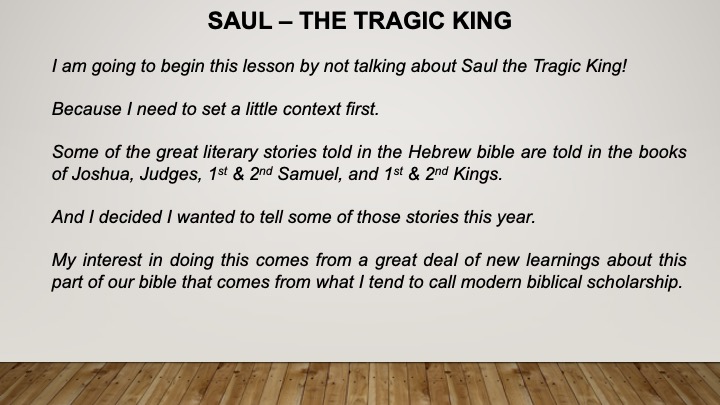
Act I Now Comes to an End
So, tune in next week and we will start in Chapter 8 and cover Act II of Saul – The Tragic King
And this most astounding piece of narrative that has come down to us from the ancient world will continue, with many twists and turns.”

Some Example 2020 Lessons
I will be teaching this year:
- Saul – the Tragic King (now)
- David and Nation Building (May)
- Solomon – a Study in Contradictions (August)
- Violence & Kindness in the Promised Land (October)
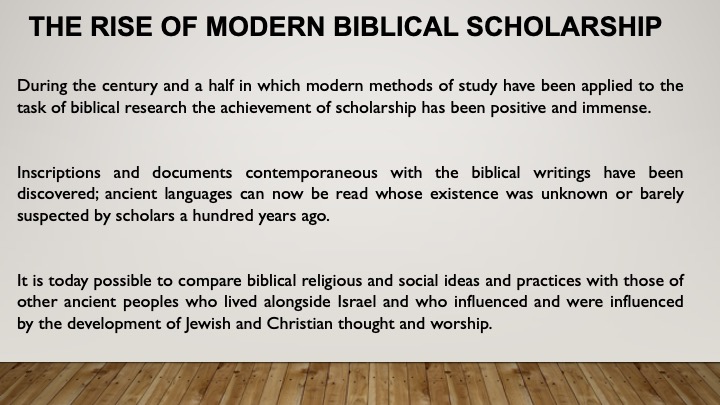
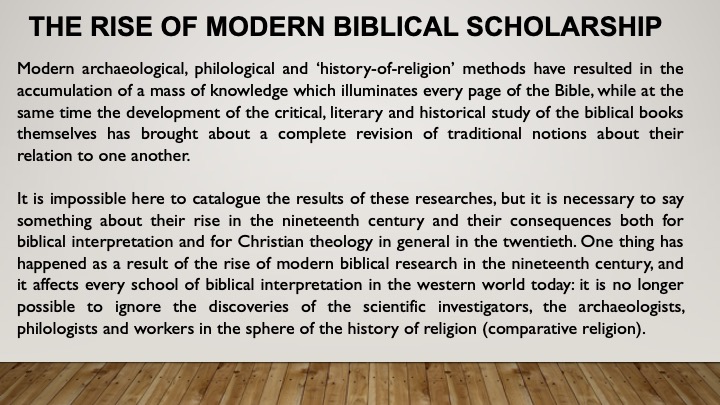
THE RISE OF MODERN BIBLICAL SCHOLARSHIP
During the century and a half in which modern methods of study have been applied to the task of biblical research the achievement of scholarship has been positive and immense.
Inscriptions and documents contemporaneous with the biblical writings have been discovered; ancient languages can now be read whose existence was unknown or barely suspected by scholars a hundred years ago.
It is today possible to compare biblical religious and social ideas and practices with those of other ancient peoples who lived alongside Israel and who influenced and were influenced by the development of Jewish and Christian thought and worship.
Modern archaeological, philological and ‘history-of-religion’ methods have resulted in the accumulation of a mass of knowledge which illuminates every page of the Bible, while at the same time the development of the critical, literary and historical study of the biblical books themselves has brought about a complete revision of traditional notions about their relation to one another.
It is impossible here to catalogue the results of these researches, but it is necessary to say something about their rise in the nineteenth century and their consequences both for biblical interpretation and for theology in general in the twentieth and twenty-first. One thing has happened as a result of the rise of modern biblical research in the nineteenth century, and it affects every school of biblical interpretation in the western world today: it is no longer possible to ignore the discoveries of the scientific investigators, the archaeologists, philologists and workers in the sphere of the history of religion (comparative religion).
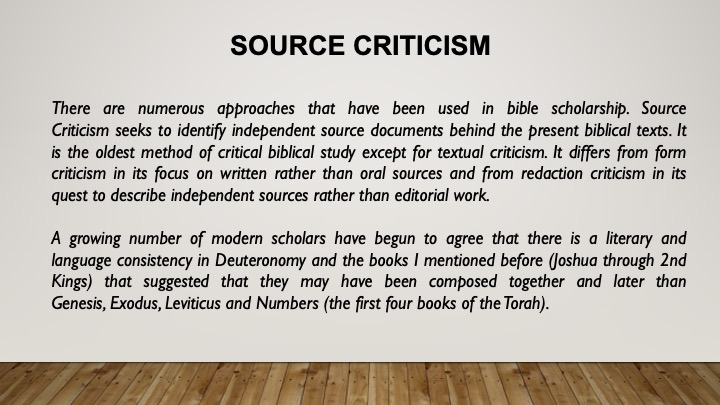
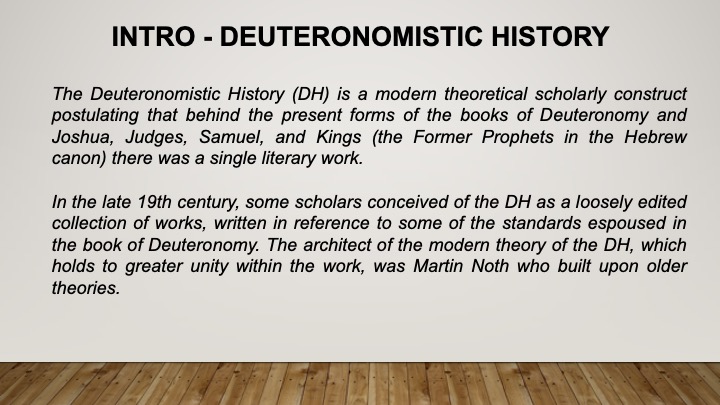
THE RISE OF MODERN BIBLICAL SCHOLARSHIP
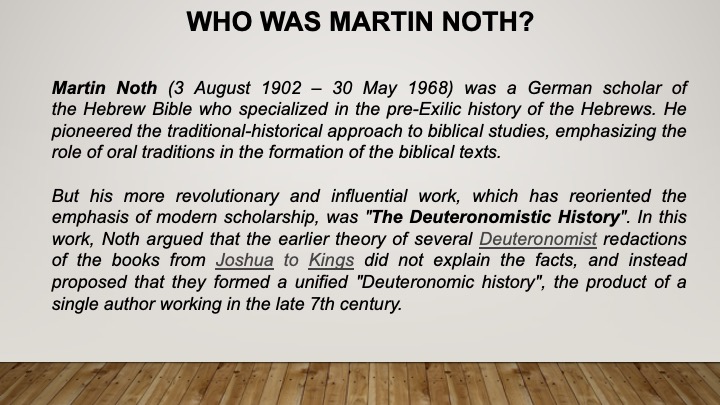
Who was Martin Noth?
Martin Noth (3 August 1902 – 30 May 1968) was a German scholar of the Hebrew Bible who specialized in the pre-Exilic history of the Hebrews. He pioneered the traditional-historical approach to biblical studies, emphasizing the role of oral traditions in the formation of the biblical texts.
But his more revolutionary and influential work, which has reoriented the emphasis of modern scholarship, was "The Deuteronomistic History". In this work, Noth argued that the earlier theory of several Deuteronomist redactions of the books from Joshua to Kings did not explain the facts, and instead proposed that they formed a unified "Deuteronomic history", the product of a single author working in the late 7th century.

Who was Martin Noth?
Noth also published commentaries on all the five books of the Pentateuch: Genesis, Exodus, Leviticus, Numbers, and Deuteronomy. And he concluded that the book of Deuteronomy was more closely related to the following books of Joshua, Judges, Samuel, and Kings (the Deuteronomistic History). This theory is widely accepted today and provides the framework for much current research on the historical books of the Old Testament.
Interestingly, a growing number of modern scholars have generally agreed that the Deuteronomistic history originated independently of the books of Genesis, Exodus, Leviticus and Numbers (the first four books of the Torah, sometimes called the "Tetrateuch", most scholars trace all or most of it to the Babylonian exile (6th century BCE).
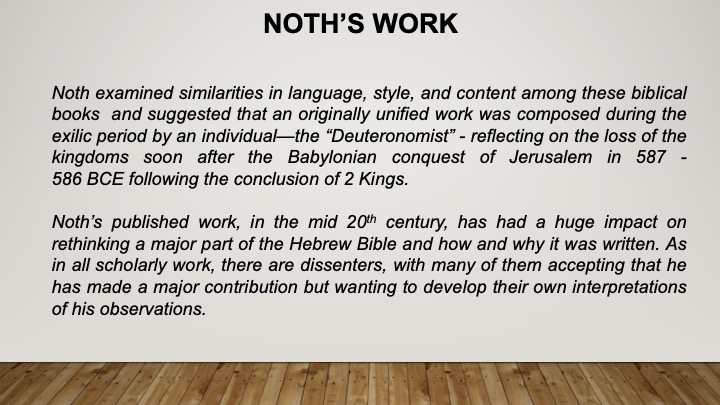
Introduction - Deuteronomistic History
Noth examined similarities in language, style, and content among these biblical books and suggested that an originally unified work was composed during the exilic period by an individual—the “Deuteronomist” - reflecting on the loss of the kingdoms soon after the Babylonian conquest of Jerusalem in 587 - 586 BCE following the conclusion of 2 Kings.
Noth’s published work, in the mid 20th century, has had a huge impact on rethinking a major part of the Hebrew Bible and how and why it was written. As in all scholarly work, there are dissenters, with many of them accepting that he has made a major contribution but wanting to develop their own interpretations of his observations.
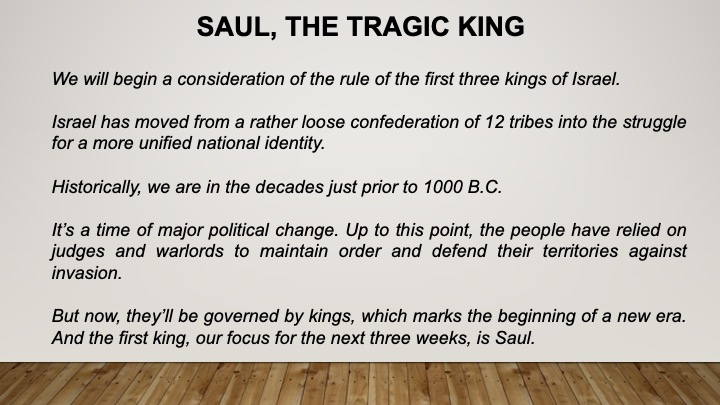
Saul The Tragic King
We will begin a consideration of the rule of the first three kings of Israel.
Israel has moved from a rather loose confederation of 12 tribes into the struggle for a more unified national identity.
Historically, we are in the decades just prior to 1000 B.C.
It’s a time of major political change. Up to this point, the people have relied on judges and warlords to maintain order and defend their territories against invasion.
But now, they’ll be governed by kings, which marks the beginning of a new era. And the first king, our focus for the next three weeks, is Saul.
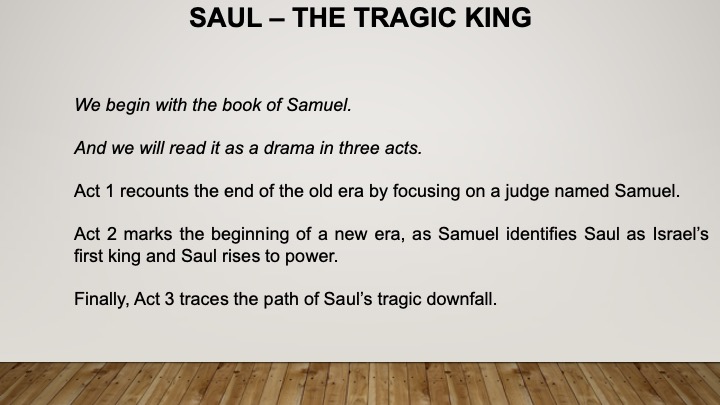
Saul, The Tragic King
We begin with the book of Samuel.
And we will read it as a drama in three acts.
Act 1 recounts the end of the old era by focusing on a judge named Samuel.
Act 2 marks the beginning of a new era, as Samuel identifies Saul as Israel’s first king and Saul rises to power.
Finally, Act 3 traces the path of Saul’s tragic downfall.
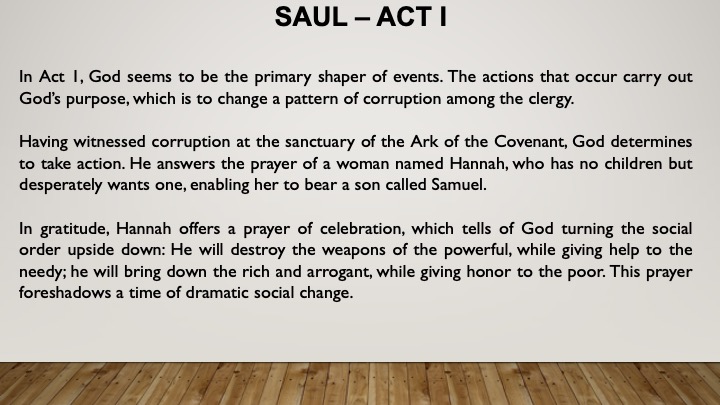
Saul The Tragic King
In Act 1, God seems to be the primary shaper of events. The actions that occur carry out God’s purpose, which is to change a pattern of corruption among the clergy.
Having witnessed corruption at the sanctuary of the Ark of the Covenant, God determines to take action. He answers the prayer of a woman named Hannah, who has no children but desperately wants one, enabling her to bear a son called Samuel.
In gratitude, Hannah offers a prayer of celebration, which tells of God turning the social order upside down: He will destroy the weapons of the powerful, while giving help to the needy; he will bring down the rich and arrogant, while giving honor to the poor. This prayer foreshadows a time of dramatic social change.
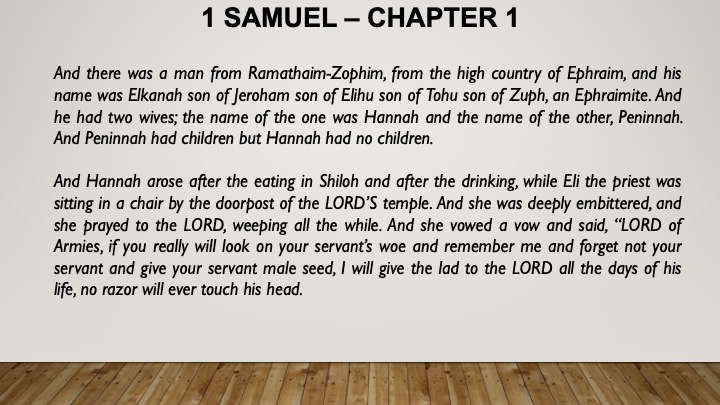
1st Samuel – Chapter 1
"And there was a man from Ramathaim-Zophim, from the high country of Ephraim, and his name was Elkanah son of Jeroham son of Elihu son of Tohu son of Zuph, an Ephraimite. And he had two wives; the name of the one was Hannah and the name of the other, Peninnah. And Peninnah had children, but Hannah had no children.
And Hannah arose after the eating in Shiloh and after the drinking, while Eli the priest was sitting in a chair by the doorpost of the LORD’S temple. And she was deeply embittered, and she prayed to the LORD, weeping all the while. And she vowed a vow and said, “LORD of Armies, if you really will look on your servant’s woe and remember me and forget not your servant and give your servant male seed, I will give the lad to the LORD all the days of his life, no razor will ever touch his head."
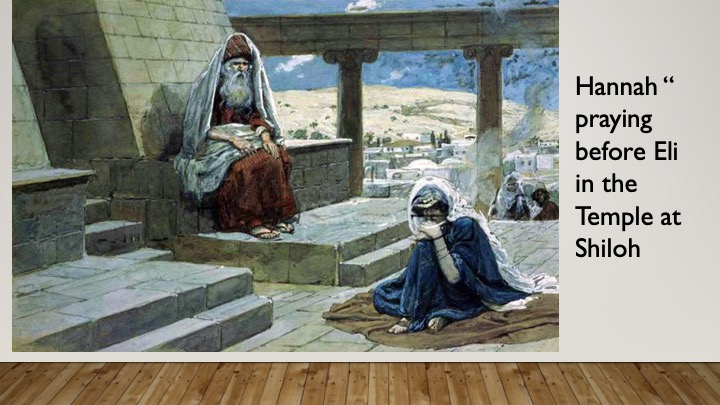
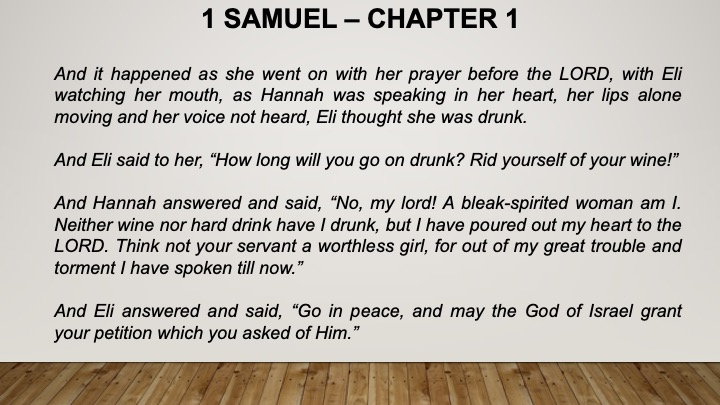
1 Samuel – Chapter 1
And it happened as she went on with her prayer before the LORD, with Eli watching her mouth, as Hannah was speaking in her heart, her lips alone moving and her voice not heard, Eli thought she was drunk.
And Eli said to her, “How long will you go on drunk? Rid yourself of your wine!”
And Hannah answered and said, “No, my lord! A bleak-spirited woman am I. Neither wine nor hard drink have I drunk, but I have poured out my heart to the LORD. Think not your servant a worthless girl, for out of my great trouble and torment I have spoken till now.”
And Eli answered and said, “Go in peace, and may the God of Israel grant your petition which you asked of Him.”
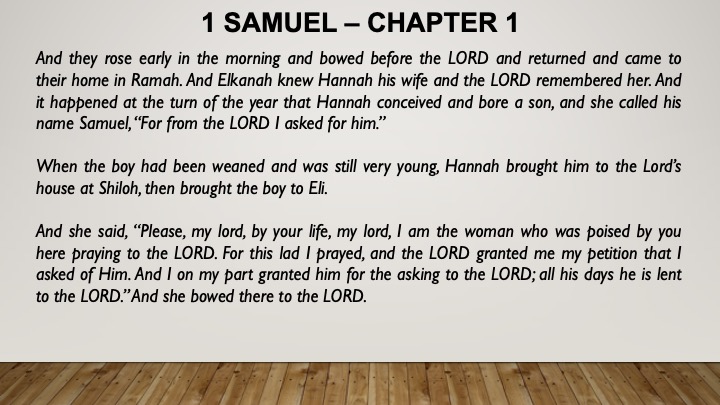
1 Samuel – Chapter 1
And they rose early in the morning and bowed before the LORD and returned and came to their home in Ramah. And Elkanah knew Hannah his wife and the LORD remembered her. And it happened at the turn of the year that Hannah conceived and bore a son, and she called his name Samuel, “For from the LORD I asked for him.”
When the boy had been weaned and was still very young, Hannah brought him to the Lord’s house at Shiloh, then brought the boy to Eli.
And she said, “Please, my lord, by your life, my lord, I am the woman who was poised by you here praying to the LORD. For this lad I prayed, and the LORD granted me my petition that I asked of Him. And I on my part granted him for the asking to the LORD; all his days he is lent to the LORD.” And she bowed there to the LORD.
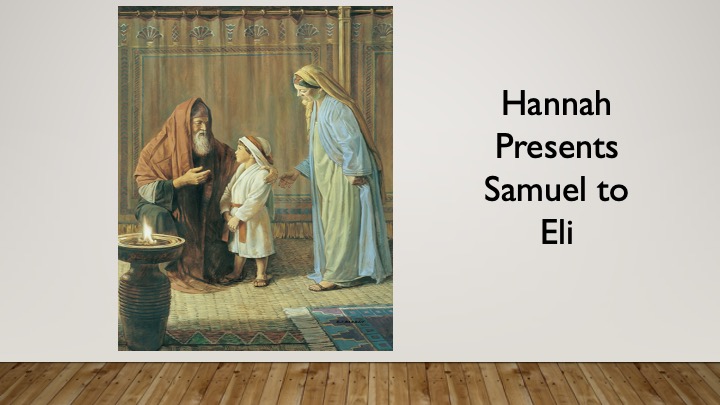
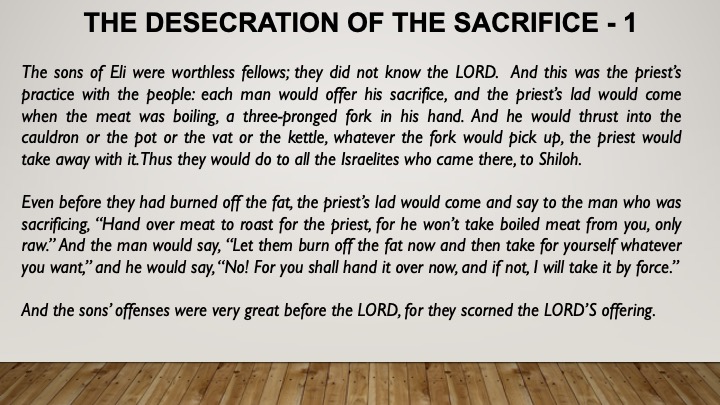
The Desecration of the Sacrifice
The sons of Eli were worthless fellows; they did not know the LORD. And this was the priest’s practice with the people: each man would offer his sacrifice, and the priest’s lad would come when the meat was boiling, a three-pronged fork in his hand. And he would thrust into the cauldron or the pot or the vat or the kettle, whatever the fork would pick up, the priest would take away with it. Thus they would do to all the Israelites who came there, to Shiloh.
Even before they had burned off the fat, the priest’s lad would come and say to the man who was sacrificing, “Hand over meat to roast for the priest, for he won’t take boiled meat from you, only raw.” And the man would say, “Let them burn off the fat now and then take for yourself whatever you want,” and he would say, “No! For you shall hand it over now, and if not, I will take it by force.”
And the sons’ offenses were very great before the LORD, for they scorned the LORD’S offering.
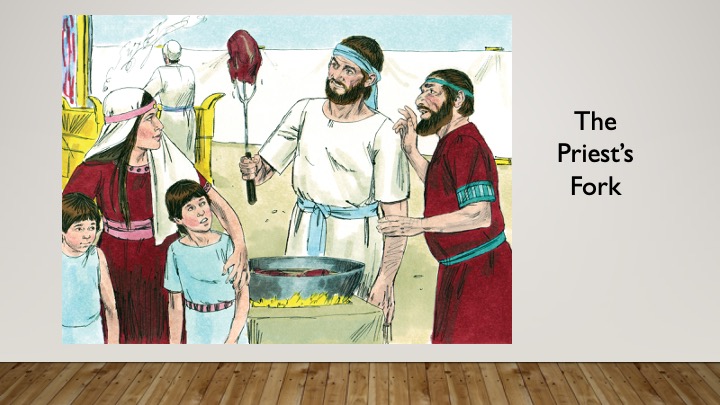
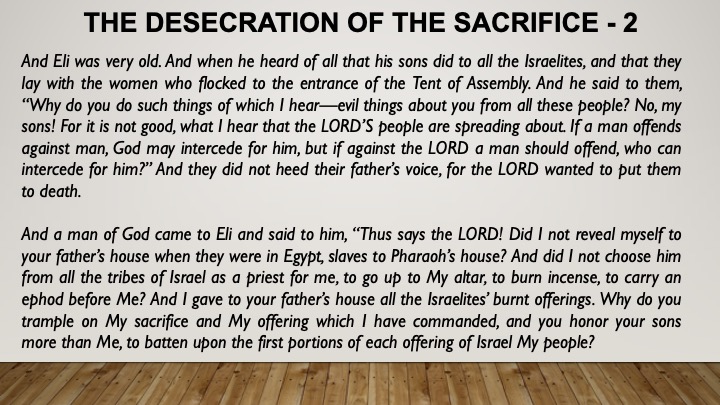
The Desecration of the Sacrifice
And Eli was very old. And when he heard of all that his sons did to all the Israelites, and that they lay with the women who flocked to the entrance of the Tent of Assembly. And he said to them, “Why do you do such things of which I hear—evil things about you from all these people? No, my sons! For it is not good, what I hear that the LORD’S people are spreading about. If a man offends against man, God may intercede for him, but if against the LORD a man should offend, who can intercede for him?” And they did not heed their father’s voice, for the LORD wanted to put them to death.
And a man of God came to Eli and said to him, “Thus says the LORD! Did I not reveal myself to your father’s house when they were in Egypt, slaves to Pharaoh’s house? And did I not choose him from all the tribes of Israel as a priest for me, to go up to My altar, to burn incense, to carry an ephod before Me? And I gave to your father’s house all the Israelites’ burnt offerings. Why do you trample on My sacrifice and My offering which I have commanded, and you honor your sons more than Me, to batten upon the first portions of each offering of Israel My people?
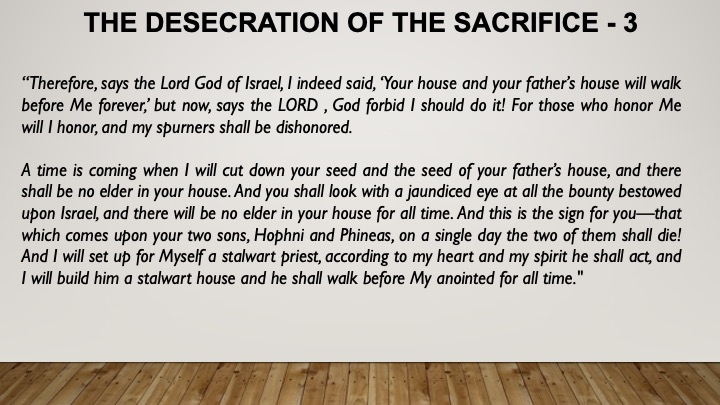
The Desecration of the Sacrifice - 3
“Therefore, says the Lord God of Israel, I indeed said, ‘Your house and your father’s house will walk before Me forever,’ but now, says the LORD , God forbid I should do it! For those who honor Me will I honor, and my spurners shall be dishonored.
A time is coming when I will cut down your seed and the seed of your father’s house, and there shall be no elder in your house. And you shall look with a jaundiced eye at all the bounty bestowed upon Israel, and there will be no elder in your house for all time. And this is the sign for you—that which comes upon your two sons, Hophni and Phineas, on a single day the two of them shall die! And I will set up for Myself a stalwart priest, according to my heart and my spirit he shall act, and I will build him a stalwart house and he shall walk before My anointed for all time."
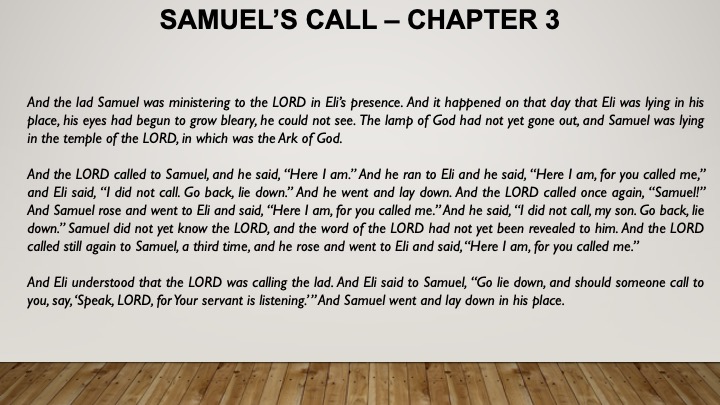
1 Samuel – Chapter 1
And the lad Samuel was ministering to the LORD in Eli’s presence. And it happened on that day that Eli was lying in his place, his eyes had begun to grow bleary, he could not see. The lamp of God had not yet gone out, and Samuel was lying in the temple of the LORD, in which was the Ark of God.
And the LORD called to Samuel, and he said, “Here I am.” And he ran to Eli and he said, “Here I am, for you called me,” and Eli said, “I did not call. Go back, lie down.” And he went and lay down. And the LORD called once again, “Samuel!” And Samuel rose and went to Eli and said, “Here I am, for you called me.” And he said, “I did not call, my son. Go back, lie down.” Samuel did not yet know the LORD, and the word of the LORD had not yet been revealed to him. And the LORD called still again to Samuel, a third time, and he rose and went to Eli and said, “Here I am, for you called me.”
And Eli understood that the LORD was calling the lad. And Eli said to Samuel, “Go lie down, and should someone call to you, say, ‘Speak, LORD, for Your servant is listening.’ ” And Samuel went and lay down in his place.
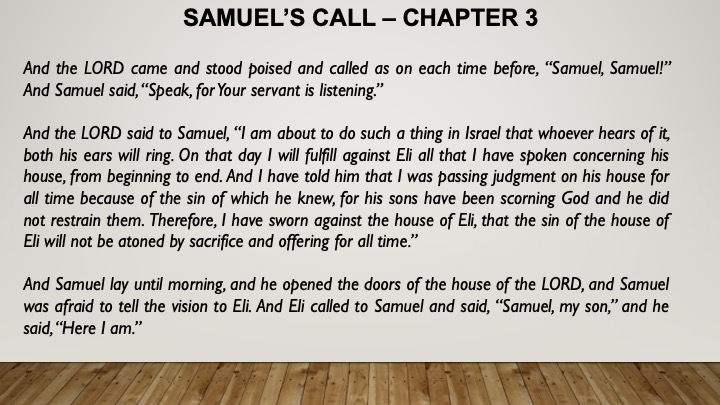
1 Samuel – Chapter 3
And the LORD came and stood poised and called as on each time before, “Samuel, Samuel!” And Samuel said, “Speak, for Your servant is listening.”
And the LORD said to Samuel, “I am about to do such a thing in Israel that whoever hears of it, both his ears will ring. On that day I will fulfill against Eli all that I have spoken concerning his house, from beginning to end. And I have told him that I was passing judgment on his house for all time because of the sin of which he knew, for his sons have been scorning God and he did not restrain them. Therefore, I have sworn against the house of Eli, that the sin of the house of Eli will not be atoned by sacrifice and offering for all time.”
And Samuel lay until morning, and he opened the doors of the house of the LORD, and Samuel was afraid to tell the vision to Eli. And Eli called to Samuel and said, “Samuel, my son,” and he said, “Here I am.”
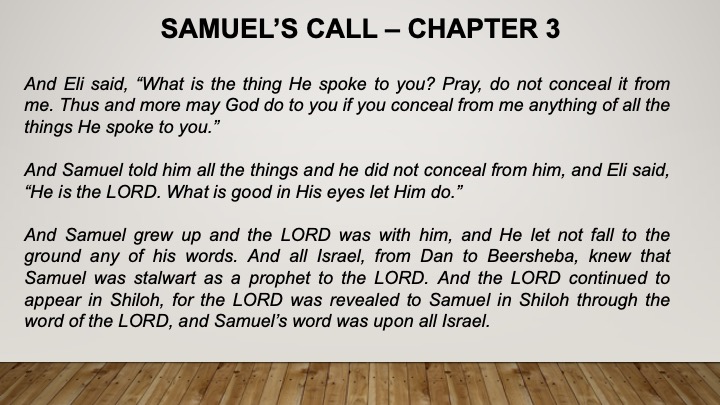
1 Samuel – Chapter 3
And Eli said, “What is the thing He spoke to you? Pray, do not conceal it from me. Thus and more may God do to you if you conceal from me anything of all the things He spoke to you.”
And Samuel told him all the things and he did not conceal from him, and Eli said, “He is the LORD. What is good in His eyes let Him do.”
And Samuel grew up and the LORD was with him, and He let not fall to the ground any of his words. And all Israel, from Dan to Beersheba, knew that Samuel was stalwart as a prophet to the LORD. And the LORD continued to appear in Shiloh, for the LORD was revealed to Samuel in Shiloh through the word of the LORD, and Samuel’s word was upon all Israel.
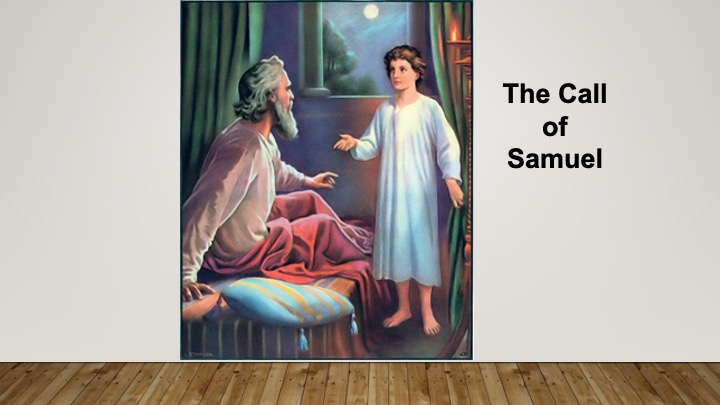
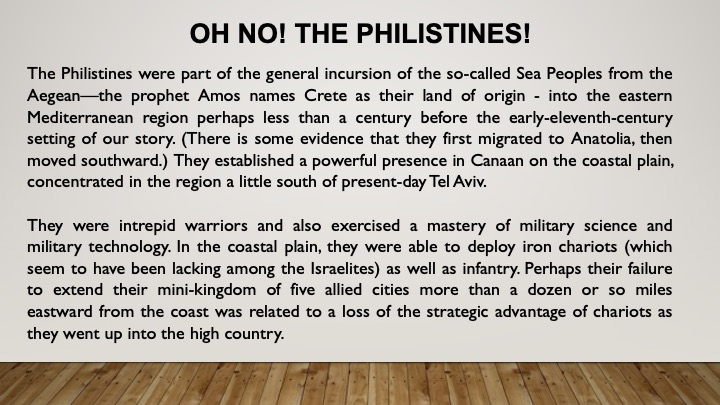
Oh No! The Philistines!
The Philistines were part of the general incursion of the so-called Sea Peoples from the Aegean—the prophet Amos names Crete as their land of origin - into the eastern Mediterranean region perhaps less than a century before the early-eleventh-century setting of our story. (There is some evidence that they first migrated to Anatolia, then moved southward.) They established a powerful presence in Canaan on the coastal plain, concentrated in the region a little south of present-day Tel Aviv.
They were intrepid warriors and also exercised a mastery of military science and military technology. In the coastal plain, they were able to deploy iron chariots (which seem to have been lacking among the Israelites) as well as infantry. Perhaps their failure to extend their mini-kingdom of five allied cities more than a dozen or so miles eastward from the coast was related to a loss of the strategic advantage of chariots as they went up into the high country.
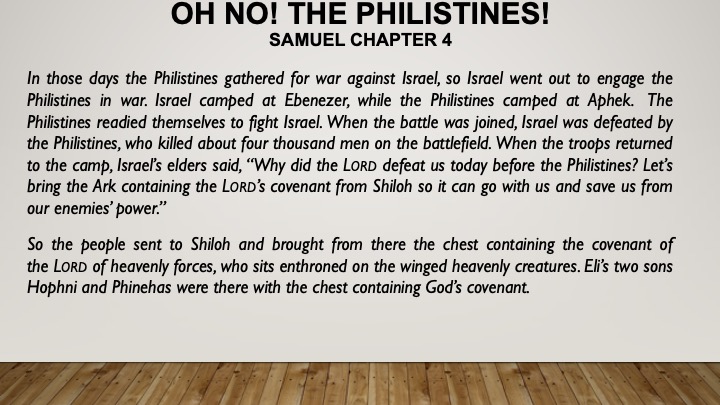
Oh No! The Philistines!
In those days the Philistines gathered for war against Israel, so Israel went out to engage the Philistines in war. Israel camped at Ebenezer, while the Philistines camped at Aphek. The Philistines readied themselves to fight Israel. When the battle was joined, Israel was defeated by the Philistines, who killed about four thousand men on the battlefield. When the troops returned to the camp, Israel’s elders said, “Why did the Lord defeat us today before the Philistines? Let’s bring the Ark containing the Lord’s covenant from Shiloh so it can go with us and save us from our enemies’ power.”
So the people sent to Shiloh and brought from there the chest containing the covenant of the Lord of heavenly forces, who sits enthroned on the winged heavenly creatures. Eli’s two sons Hophni and Phinehas were there with the chest containing God’s covenant.
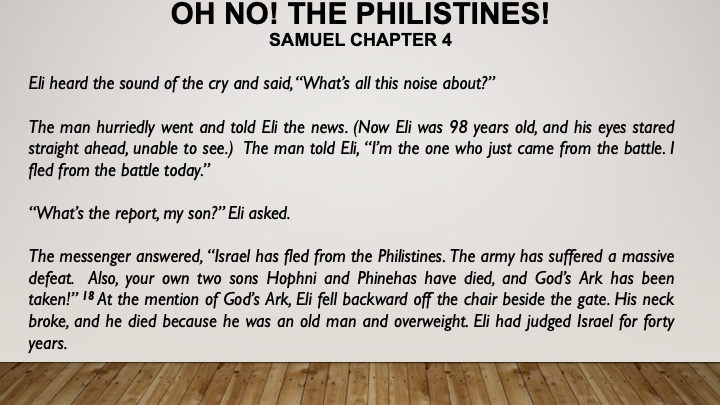
Oh No! The Philistines!
Eli heard the sound of the cry and said, “What’s all this noise about?”
The man hurriedly went and told Eli the news. (Now Eli was 98 years old, and his eyes stared straight ahead, unable to see.) The man told Eli, “I’m the one who just came from the battle. I fled from the battle today.”
“What’s the report, my son?” Eli asked.
The messenger answered, “Israel has fled from the Philistines. The army has suffered a massive defeat. Also, your own two sons Hophni and Phinehas have died, and God’s Ark has been taken!” 18 At the mention of God’s Ark, Eli fell backward off the chair beside the gate. His neck broke, and he died because he was an old man and overweight. Eli had judged Israel for forty years.
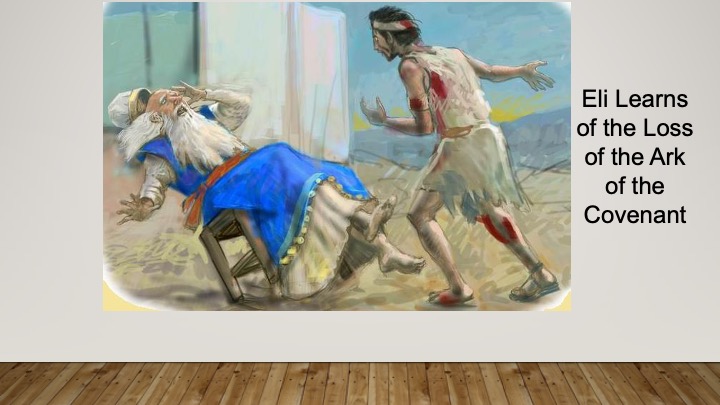
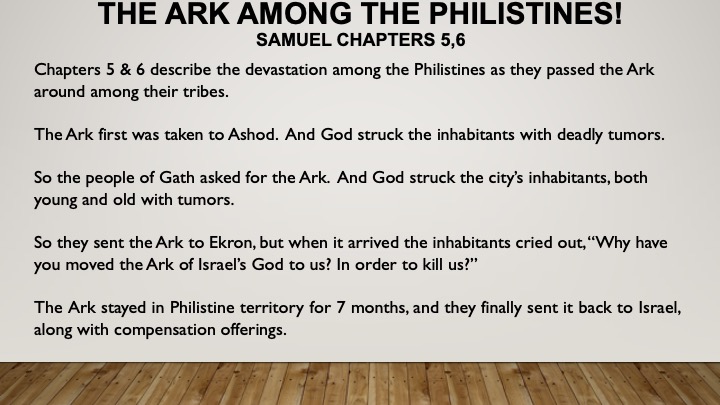
The
Ark Among The Philistines!
Chapters 5 & 6 describe the devastation among the Philistines as they passed the Ark around among their tribes.
The Ark first was taken to Ashod. And God struck the inhabitants with deadly tumors.
So the people of Gath asked for the Ark. And God struck the city’s inhabitants, both young and old with tumors.
So they sent the Ark to Ekron, but when it arrived the inhabitants cried out, “Why have you moved the Ark of Israel’s God to us? In order to kill us?”
The Ark stayed in Philistine territory for 7 months, and they finally sent it back to Israel, along with compensation offerings.
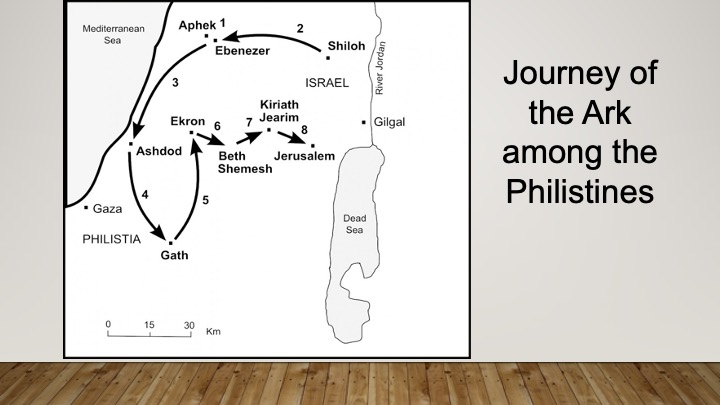
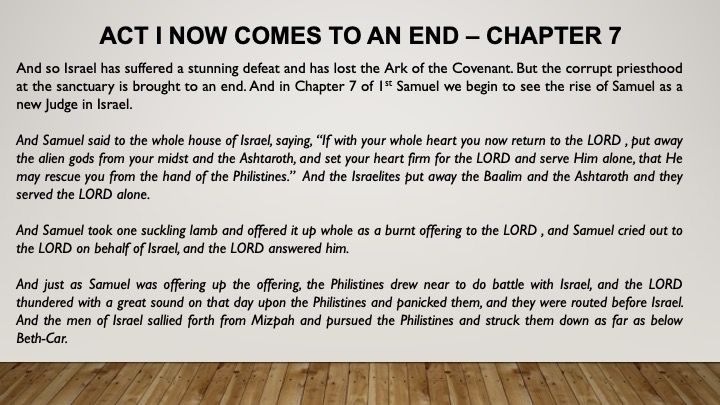
Act I Now comes to an end – chapter 7
And so Israel has suffered a stunning defeat and has lost the Ark of the Covenant. But the corrupt priesthood at the sanctuary is brought to an end. And in Chapter 7 of 1st Samuel we begin to see the rise of Samuel as a new Judge in Israel.
And Samuel said to the whole house of Israel, saying “If with your whole heart you now return to the LORD , put away the alien gods from your midst and the Ashtaroth, and set your heart firm for the LORD and serve Him alone, that He may rescue you from the hand of the Philistines.” And the Israelites put away the Baalim and the Ashtaroth and they served the LORD alone.
And Samuel took one suckling lamb and offered it up whole as a burnt offering to the LORD , and Samuel cried out to the LORD on behalf of Israel, and the LORD answered him.
And just as Samuel was offering up the offering, the Philistines drew near to do battle with Israel, and the LORD thundered with a great sound on that day upon the Philistines and panicked them, and they were routed before Israel. And the men of Israel sallied forth from Mizpah and pursued the Philistines and struck them down as far as below Beth-Car.
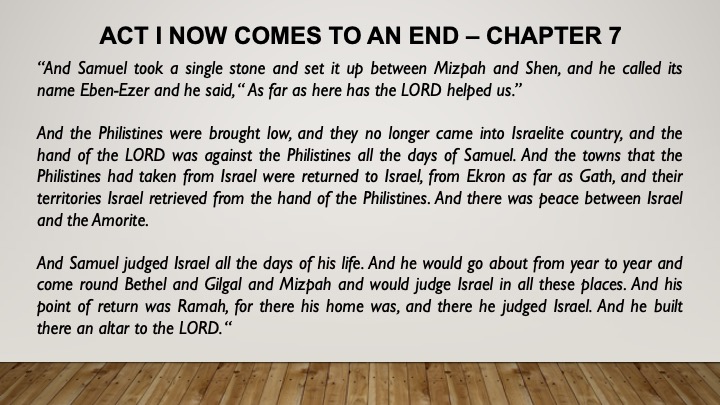
Act I Now comes to an end – chapter 7
“And Samuel took a single stone and set it up between Mizpah and Shen, and he called its name Eben-Ezer and he said, “ As far as here has the LORD helped us.”
And the Philistines were brought low and they no longer came into Israelite country, and the hand of the LORD was against the Philistines all the days of Samuel. And the towns that the Philistines had taken from Israel were returned to Israel, from Ekron as far as Gath, and their territories Israel retrieved from the hand of the Philistines. And there was peace between Israel and the Amorite.
And Samuel judged Israel all the days of his life. And he would go about from year to year and come round Bethel and Gilgal and Mizpah and would judge Israel in all these places. And his point of return was Ramah, for there his home was, and there he judged Israel. And he built there an altar to the LORD. “
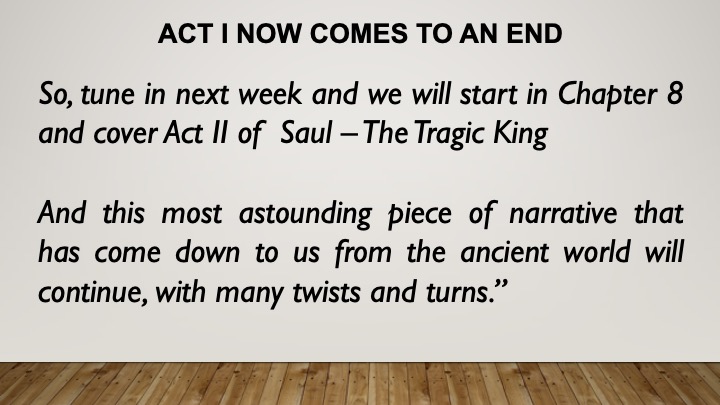
End Act I of Saul the Tragic King
So, tune in next week and we will start in Chapter 8 and cover Act II of Saul The Tragic King
And this most astounding piece of narrative that has come down to us from the ancient world will continue, with many twists and turns.”